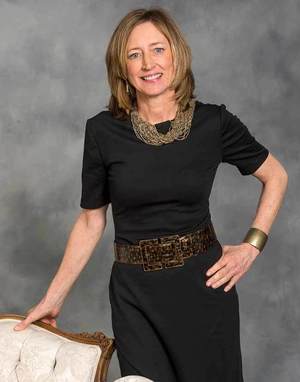Women Lead: Ann Tenbrunsel
Published: March 8, 2016 / Author: University of Notre Dame

ANN TENBRUNSEL
David E. Gallo Professor of Business Ethics
Mendoza College of Business
Before the stock market turn of 2008, before Enron and WorldCom collapsed years earlier; before “Ponzi scheme,” “subprime” and “Madoff” were household terms, Ann Tenbrunsel, the David E. Gallo Professor of Business Ethics, was publishing research on what causes people to behave unethically. If there were questions about the application of the work to the business world, those were emphatically answered as the public read headline after headline about corporate fraud and corruption.
“People get why it’s important to the bottom line now,” Tenbrunsel says.
That’s not to imply people always act in accordance with this knowledge. In fact, much of Tenbrunsel’s research focuses on the gap between how people say they’ll act and how they truly act in the moment of truth. Tenbrunsel calls these gaps “blind spots,” and her book by the same title takes a deep dive into how they arise and what to do about them.
“It’s not that people don’t have values,” Tenbrunsel says, “but they fail to account for the strain on these values in the moment of decision.” Tenbrunsel frames this tension as the difference between the “should self,” which predicts how a person will act in a given situation based on the values they espouse, and the “want self,” which is typically silent during this planning phase but emerges forcefully at the time of action, reminding the person of their own self-interest and desire. Most people believe they will do the right thing, but few realize the wide array of influencers that will be present when it comes time to act: fear, anger, fatigue, expediency, potential for wealth and more. “All of that leads to what we call ethical fading at the time of the decision,” Tenbrunsel explains. “While from a distance, we may see the ethics in the decision, these influences fade the ethics from the decision at the time we need to act. As a result, because we don’t characterize it an ethical decision, our ethical principles we may hold dear are less relevant to the situation.”
Ethical fading becomes especially problematic when people no longer see business decisions as ethical decisions. The fraudulent accounting procedure meant to cover a mistake may lead to larger ethical slips down the road, and cost people their employment, retirement, or more. It is a problem that transcends industries, and borders. Last spring, Tenbrunsel convened the Inequality, Trust and Ethics conference at the Notre Dame London Global Gateway, bringing together academicians from across the globe to discuss the intersection of the title topics on behaviors exhibited in and outside of business.
Tenbrunsel continues to share her research globally to resonant audiences (“People resonate with the fact that they don’t live up to their own values,” she says), and was named one of the 100 Most Influential People in Business Ethics by Ethisphere, a leading business ethics publication and watch group. The list contains the likes of Tesla founder Elon Musk, U.S. deputy attorney general Sally Quillian Yates, and Pope Francis. The recognition in her field is well-received, but Tenbrunsel notes she is one of multiple scholars at Notre Dame whose work emphasizes the fact that success and ethical behavior need not be mutually exclusive.
“At Notre Dame, I don’t have to ‘sell’ this approach or argue for its legitimacy,” she says. “It is embraced as a concept fundamental to our mission. One only need look at the number of faculty, centers, institutes and conferences examining ethical issues to get an idea of the extent to which scholarly research on this topic is embedded here.”
Related Stories




